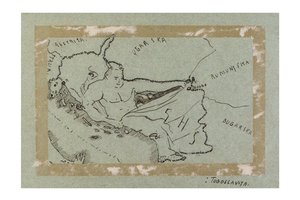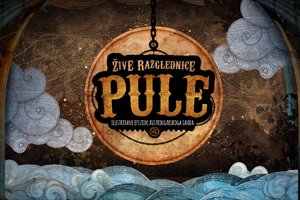An Essay About the Theme: No Man Is an Island
Island – Ghetto – Asylum
Musings ahead of the 21st Book Fair(y) in Istria 2015
No man is an island, entire of itself;
every man is a piece of the continent, a part of the main.
If a clod be washed away by the sea, Europe is the less,
as well as if a promontory were, as well as if a manor of thy friend's or of thine own were.
Any man's death diminishes me because I am involved in mankind;
and therefore never send to know for whom the bell tolls; it tolls for thee.
John Donne
When we decided to dedicate this year’s book fair to the subject of Island – Ghetto – Asylum, this issue already had social power, a certain charge, there were plenty of unanswered questions, all it takes to fill a ten-day literary event with discussions and conversations. Incidentally, judging by the new editions in the domain of literary production, both Croatian and translated, we might conclude that this subject has already pervaded the public interest. However, all that happened in the months prior to the opening of the 21st Book Fair(y) in Istria off the coasts of Europe and at its border crossing points, Croatian including, the destructive power gained by this topic, and how it basically grew to relevance – not only out of political, but also out of universal, human reasons, important for mankind – that we could hardly imagine.
Images of thousands, millions of people embarking on a journey from their war-torn and terror-clad homelands to save their lives by fleeing to safe neighbouring countries, or those on a long, hard and dangerous voyage to Europe, struck us just like many other people. How can a book fair and a literary festival, we wonder, make a contribution in these hard times? Naturally, the same as ever – by connecting people, opinions and views, by connecting experts and authors from all over the world to discuss these matters. It can, together with the audience, think out loud, explore points of view relevant to the subject matter, observe them from different angles. And thus set things in motion. Because this is the point. Just a few weeks ago our festival focus would be lost in the crowd. A social, academic, literary and political field of discourse and dialogue, but nevertheless one of the many possible. This is now out of the question. We were overtaken by reality. And it is this dimension of urgency and high priority that lies in the background of the European refugee policy issue, followed by asylum, this is the urgency expressed in John Donne’s poem from the beginning of this essay. And that it why it became a leitmotiv of the text describing this year’s book fair programme. To begin with, a few words about the poem, as it is also the introduction into our theme focus.
Although John Donne (1572-1631) wrote the above lines a few hundred years ago, although they have often been quoted and used in different contexts (Hemingway borrowed the first line, Johannes Mario Simmel the last one, just like several other writers named their books after this poem, there is even a German film called No Man Is an Island, made in 2011), it seems nevertheless that this poem, also one of the most magnificent poems in world literature, is the ideal motto for our events, not only because of the island motif, but also because of its structure and all the connotations it bears.
No man is an island. This very first line is a plea, a call. A call which is in our context in fact odd, because the literary world is mostly about productions demanding isolation, solitude and distance. Creating literature truly is a solitary job, and it takes only one reader and one book for the act of reading. Literature-makers have to, at least at a certain point, retreat in order to create. Step away from everything that surrounds them. It was like that for Shakespeare’s contemporary John Donne, as well. Despite that, John Donne began with the introductory phrase expressing a kind of conclusion regarding the human nature, which is also true of literature. Because, although creating and perceiving literature take place in isolation, their objective is connection. We read in order to connect with others, with real or imaginary characters, and we also write in order to connect with an outside world, imaginary or readership’s. Literature primarily strives for dialogue.
And when we read Donne’s original English sentence, how the poet put it down, ‘No man is an iland’, without the S which the word acquired only later, we uncover another meaning: No man is an I-land. The recently departed German cabaret artist and writer Dieter Hildebrandt drew attention to this fact back in 1975, reading the poem as follows: This is one of the most powerful solidarity poems, a poem of immense involvement, one could say a kind of the first Internationale. Here someone is speaking about altruism as it otherwise appears only in the Bible. And despite its epigrammatic nature, despite a certain sententiousness and pleading character, this is a perfect poem.
Hildebrandt could not know back then that the map of Europe in 2015, 40 years later, will show only I-lands, small ego-countries, ego-individuals eternally coerced to self-optimise and perpetually self-centred. And that they will live in societies that make it possible for them, whose schools and educational institutions will work on new generations of such ego-individuals, that they will live in economic systems demanding such individuals. People, alienated from each other. Have we really become islands? Each man his own island? That could also be discussed at the fair.
No man is an island
This portion of land at hand here, surrounded by sea, lake or river, is a plot separated from the rest of land. The motif of island is as old as world literature. Primarily here we refer to Robinsoniads and Daniel Defoe’s prime- Robinsonade, the story of Robinson Crusoe who lives alone on an island until he is joined by Friday. He is a man fighting against unknown nature that yet needs to be experienced and explored. The island myth, however, is much older. It appears in Odyssey, and after Homer many writers wrote about the island. Goethe, for instance, Jules Verne, Jean Paul and others dreamed a dream of solitary survival on an island. Islands are perfect locations for enlightened rite-of-passage stories and sometimes, given how Crusoe and Friday talk about faith, even missionary stories. There were no undiscovered islands during these writers’ lives, just like there are none today, but nevertheless a longing for isolated life in pristine nature, unattainable to others, is particularly alive. Some of these familiar stories have become engraved in our memory, stories like Ballantyne’s The Coral Island, Stevenson’s Treasure Island and many others. There is an idea that a man on an island after a shipwreck (which represents a certain purgatory, a shipwreck in itself is a literary topos) will encounter a world beyond the known social norms. There he could make a fresh start, alone or with a bunch of people, and lead a life defying everything. Through accents in these stories the authors reach different constructs, create social, anthropological, religious or political utopias, ideal societies which might hold the key to an alternative life. Or they turn island stories into dystopias in which the island exists as a ‘bad’ place, as the Greek word’s root suggests, i.e. a story ending badly. Islands are as complex as life itself, they hide countless challenges. As in literature, utopias and dystopias are found in many films, Hollywood productions regularly go back to the topos, as seen from the extreme popularity of the American TV series Lost.
Horst Brunner, a German linguist who extensively focused on the island topos in literature and wrote a poetics of the island, says: To the space of an island it is crucial to evaluate the dialectic ratio between ‘world’ and ‘island’. An island can be better or worse than the world it opposes. There is no third possibility. (1967)
An island, with its solitariness, can take people to the core, to the existential issues of human nature, it can make decisions on the protagonist’s life and death, it can make dreams of freedom come true, it can enrich them and expand horizons. But on the other hand, it can be frighteningly unpleasant and inhospitable. The synchronicity of all these possibilities is something that has for centuries fed the island myth.
At this year’s Book Fair(y) in Istria, Joachim Sartorius will address these issues at the presentation of his book The Princes’ Islands, a book about the iconic islands he spent a while on. Prens Adalari, as they are called in Turkish, are a natural sensation near the megalopolis of Istanbul, located in the Sea of Marmara and marked with human history. Sartorius’ poetic, observational and curious quest is a travelogue, but also a book of longing which next to the exploration of historical events in the region symbolises mostly this: a testimony of the magnetism of such places, their solitude and detachment from existential reality, only 15 minutes away by a speedboat. An ideal place for writing, for example, because the detached writing approach is mirrored in the distance from land. The Princes’ Islands and their serenity, quiet and solitude are the generators of storytelling. This is what Sartorius writes about.
Another book fair guest is Jon Kalman Stefansson, the Icelandic writer who has been living all his life on an island, who worked both as a fisherman and a university professor, and did many other things. Mostly he writes about the nature surrounding him, about long, cold winters when the sky merges with the earth not only on the horizon. His island literature has nothing in common with the myths of the South Seas, it speaks about primordial nature and people exposed to its whims, as well as about its magnificent beauty.
Better known around here by the poetisation of growing up at sea or on an island is Italian writer Erri de Luca. At the book fair he will be presenting his novel The Story of Irene, about a little girl’s unhappy childhood on a Greek island. Here, as in all of his books, we are left stunned by his remarkable and refined prose which even in the tiniest and simplest objects of perception finds an aura of poetry.
Aside from the literary, mythical and figurative island, there are actual islands which due to their geographic position have a special meaning in both real and metaphorical sense. Islands are the ideal place for spatial estrangement from what on the land one does not want to have within visible reach. That is why some islands were turned into cemeteries, throughout history some islands became the last stop in life of those suffering from infectious diseases and, finally, prisons of all kinds were often situated on islands. Alcatraz and Goli otok are just two examples of a prison camp that literally forced out and removed prisoners from the society and placed them on an island without a possibility of escape.
Islands that in our times play an important role and as such permeate our perception are located between the European and African continent. One such place is Lampedusa, a southern European island in the Mediterranean, 205 kilometres off Sicily and 130 kilometres off the coast of northern Africa. This book fair will focus on Lampedusa quite frequently as the symbol of the refugee crisis – for some this is the first safety point after the Mediterranean escape route, and for others it is a never reached destination. Whoever made it to Lampedusa has survived the most difficult part of the journey. Many refugees never reach the shore. The Mediterranean is generally the most dangerous border crossing in the world. Since 2000, 23 thousand people have died in an attempt to cross it. Lampedusa still welcomes about 2300 new refugees daily.
A similar situation hounds the island of Lesbos in Greece, where people from Syria and Afghanistan arrive via Turkey. In order to cross from the coast to the port on the other side of the island, they have to walk 50 kilometres because there are almost no buses for them. These days another continuous flow of people is starting to move from one to the other side of the island. In Greece, like in many other countries along the Balkan route, especially in Hungary, refugees cannot count on the help of official and state authorities. Only non-government volunteers help make it easier for them. The official side in some countries acts just the opposite – they build fences and walls which are supposed to impede the continuation of their journey. At our book fair we will also address the issue of how Europe will cope with the refugee surge and which political changes should occur to settle the matter favourably to all parties. Has European policy failed? What were the European flops and responsibilities related to the refugee crisis? How to intervene politically in the countries the refugees come from? The book fair is hosting different panel discussions on the subject of nations and migrations, on Lampedusa and other islands of significance in the context of migration.
If the sea should wash away a piece of soil
Focusing on the subject of island, ghetto and asylum in the social sense is always a musing on the foreign, on the other and on how communities and individuals respond to it. This subject is the focus of ethnology and sociology. At the Pula book fair academics from these fields will discuss the psycho-social consequences of migration and the social contexts related to the notion of foreigner in a community. The concurrence of closeness and distance (Georg Simmel) in a foreigner within a society is still an unsolved puzzle that leads to social conflicts. In human interrelationships there is always a discrepancy of the non-common, of different details that swiftly become stereotyped. To Georg Simmel the history of European Jews back in 1908 served as a classic example of a history of social interrelations, i.e. observations on the subjective and collective appropriation or rejection of the other. Cultural diversity and actual practice in the country is one thing Croatian publishers and librarians will focus on during the book fair.
In a negative sense, social islands become ghettos. Albeit not surrounded by sea, they are nevertheless neighbourhoods at the furthermost outskirts of a city. The notion of ghetto in history has never born as negative a connotation as it does today, after World War II. The first ghetto appeared in the 16th century in Venice, the so called ‘Ghetto nuovo’, the new foundry. In late Middle Ages ghettos were neighbourhoods or streets assigned to Jews for residential and commercial purposes. It was only the national socialists during World War II who established ghettos as places for the deported Jews in occupied Poland and annexed Czechoslovakia. They closed parts of the city and housed people under the worst possible living conditions before they sent them to extermination camps. These ghettos were places of hunger, disease and misery. After the war, the ghettos penetrated into literature. One of the first poetic memorials was the poem Campo di Fiori by Czesław Miłosz, written during or immediately after World War II. Since he himself barely survived occupation and war, he had a mental image of Giordano Bruno who was burned at stake and compared this image to the victims of rebellion in the Warsaw ghetto, making a parallel between the Roman Campo di Fiori and the ghetto. At times wind from the burning / would drift dark kites along / and riders on the carousel / caught petals in midair. / That same hot wind / blew open the skirts / of the girls / and the crowds were laughing / on that beautiful Warsaw Sunday. By this day no one has ever managed to describe the Warsaw ghetto in a poem as intensely as Miłosz.
Andrzej Szczypiorski and other prose writers followed, such as Jurek Becker and his novel Jacob the Liar. Several years ago Swedish writer Steve Sem-Sandberg in his book The Emperor of Lies told a story of a ghetto based on Łódź chronicles and protocols, engendering a detailed and shocking document of the misery, sorrow and despair of life and non-life of the place.
For whom does it toll?
A place where the entire European idea suddenly came into the limelight was the so-called Euromaidan in entire Ukraine. While the first Ukrainian Orange Revolution was still fighting for fundamental human rights and democracy, Euromaidan in 2013/2014 loudly advocated the European idea. Just remember the powerful scenes those days that arrived via our TV screens and so graphically illustrated all the discrepancies of the demands addressed to the European Union. At a time when angry and disappointed citizens of Spain and France protested over economic reasons and burned EU flags, in the streets of Ukraine people were killed by sniper bullets and their bodies were covered by the same dark blue star-spangled flags. The first victims of the Ukrainian crisis literally died for the European idea which obviously dropped out of focus of the very members of this community. The European Union has a long ago become a community of different interests – economic, political and national – and the national interests seem to gain ever more importance. The result is a visible turn to nationalism in many of our neighbouring countries. What is missing is a common idea reflected in a common European foreign policy. A common foreign policy almost does not even exist, just like a common political vision. What political project, we wonder, could have the strength to develop a new common European utopia? We are looking forward to discussing this at the 21st Book Fair(y) in Istria with Ukrainian authors Yuriy Vynnychuk and Oleksandr Irvanets.
At this moment the breaking news, coming either from the Arabic world overseas or the Croatian, Serbian or Slovenian borders where thousands of refugees gather on a daily basis, from the Mediterranean islands and shores or from the crisis-ridden ‘island’ of Ukraine, demand a serious public dialogue, new positions and visions of European responsibility. We have lost our trust in the fact that the European idea of united in diversity possesses emancipation capital and that this capital bears its responsibility. In that sense we cannot simply inquire about the contribution in admitting new members states to the union, or even criticise some of those 28 union members, but rather we should inquire about the long-term consequences of not admitting certain countries crucial for the stability of European coexistence. What is the price of rejecting new possible members.
That is why the plea of John Donne, whose vigorous voice from a few hundred years ago is calling on us not to forget that no man is an island, is not just a philosophical and anthropological duty of the current moment, but also a political message, no matter how idealistic this may sound. The times when we cared only about our narrow circle of action are over. Every man – Croatian, French, German or one of the refugees on a European border, be it a citizen of Ukraine or Iran, Syria or even the territory under the jurisdiction of the ISIS powerhouse – every man is a member of mankind and every man is our business. Just like Donne’s poem says: Any man's death diminishes me because I am involved in mankind.
At this year’s book fair we wish to introduce a discourse on these issues. We wish to draw attention to the imminence of such a discourse. We have invited participants who represent different points of view – literary, cinematic, philosophical, sociological and political – writers, scholars and creative people from different fields of artistic and academic world and we expect a lot from vibrant debates, discussions and promotions. We eagerly wait for new editions to be presented with publishers, authors and translators.
Island – ghetto – asylum – no other topic is now more important.
No man is an island, that much we already know from John Donne’s opening line. Similarly, no community, no society can be an island and refuse to take part in such debates. We take it seriously and we do not ask for whom the bell tolls. It tolls for all of us!








